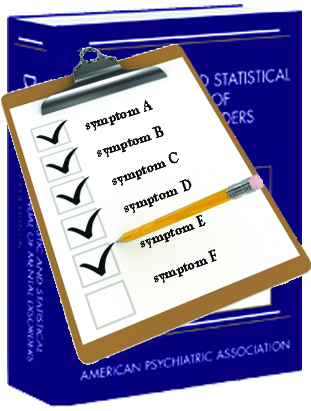Translating Accurate Diagnosis into Effective Treatment, Part Two
Within the frame of the current DSM, a number of issues relevant to substance abuse disorders may have been overlooked.
Our own experience of recovery, coupled with our research over several years, has made us curious as to why the way addicts and alcoholics themselves talk about their condition (“an emotional disease,” “a parasite the feeds on our emotions”, “an emotional cancer,” “a fear based disease”) is rarely considered in theories of addiction.
We doubt that addicts are wrong in these descriptions of their disease. In fact, we have taken the opposite approach, and started to examine research for clues as to whether addiction and alcoholism have their roots in emotional dysregulation and emotional processing deficits.
The processing deficits associated with emotional dysregulation shape decision making challenges, distress-based impulsivity, and lack of inhibition across various psychological domains, such as executive dysfunction. Emotional dysregulation also heightens reward sensitivity. This combination may be a potent risk factor for the development and persistence of addictive disorders1.
We suggest emotional dysregulation can account for the majority of symptoms seen in addicts and alcoholics. For us, any definition or diagnosis needs to aim for this type of universality and systemic consistency to be valid.
It needs to explain a disorder across various strata, from neurobiological mechanisms to manifest behavior. It needs to satisfactorily explain observable symptoms of a disorder in its sufferers. It needs to have the validity sought above. It needs to move beyond “atheoretical” and be driven by experimental research that has sound conceptual rationale—based not on “consensus about clusters of clinical symptoms” but on objective laboratory measurement.
Let’s experimentally test these theoretical accounts.
There is a growing body of evidence that demonstrates altered morphology, functionality and connectivity of brain regions and the neural networks related to emotional regulation. This certainly suggests inherent impairments in processing and regulating emotion. Such impairments would have effects on impulsivity and decision making deficits, as well as difficulties in regulation of stress and behavior.
The “atheoretical” DSM previously used a working group to consider what constituted “craving”2 and forwarded an essentially neurobiological account based on reinforcement models (not particularly “atheoretical.”) These “conditioning” accounts of craving have been challenged, with some researchers suggesting emotional dysregulation also provides a comprehensive “cognitive” account of craving.3
We firmly believe that viewing addiction as the consequence of emotional dysregulation opens up the possibility of more co-operative therapeutic exchange in relation to addiction. All major treatments and recovery supports, from 12 step groups to ACT or DBT, can easily be framed or reframed to view addiction and alcoholism as disorders of emotional regulation.
This would facilitate a move towards universality of treatment, too. Even CBT’s cognitive distortions can be viewed as the consequence of emotional dysregulation, such as catastrophizing.
Prevention can also benefit from considering emotional dysregulation. Many emotional regulation difficulties serve as vulnerabilities or risk factors for later addiction, especially in children of alcoholics. Measuring biomarkers, such as heart rate variability (a putative index of emotional dysregulation,) can aid us in highlighting these. We can intervene to help reinforce emotional regulation strategies, and tackle this disease at source.
To help those at risk and those currently suffering from addiction we first have to accurately define the disorder and accurately diagnose difficulties; only then can be hope to be more effective in treating this most profound of mental disorders.
References:
1. Aldao, A., Nolen-Hoeksema, S., & Schweizer, S. (2010). Emotion-regulation strategies across psychopathology: A meta-analytic review. Clinical psychology review, 30(2), 217-237.
2. Agrawal, A., Heath, A. C., & Lynskey, M. T. (2011). DSM‐IV to DSM‐5: the impact of proposed revisions on diagnosis of alcohol use disorders. Addiction,106(11), 1935-1943.
3. Murphy, A., Taylor, E., & Elliott, R. (2012). The detrimental effects of emotional process dysregulation on decision-making in substance dependence. Frontiers in integrative neuroscience, 6.
The author notes: “We write under the pseudonym Paul Henry as we are recovering persons who are also PhDs and academics and wish to remain anonymous for now. We discuss how accurately research describes alcoholics in recovery, models relapse, aids effective treatment, or allows families/loved ones to comprehend this neurobiological disease and why alcoholics are the way they are.” Paul Henry’s blogs include Inside the Alcoholic Brain, and The Alcoholic’s Guide to Alcoholism. You can find them on Twitter as Drunken Neuron.
Please Comment Below
[serialposts]














Thanks again for your comment Scott. Rather than rehash what I wrote last time – your main question Scott was whether we have to make a leap to attribute traits like “distress based impulsivity and short term decision making” to “emotional processing and regulation difficulties which are pertinent to this disorder”. No, I wouldn’t say this was a leap at all. Let me provide another example to illustrate what I mean. Those with emotional processing difficulties as seen in individuals with alexithymia also have a similar decision making profile as alcoholics and even in those premorbidly. This similar decision making profile appears to recruit a more motor-expressive area of the brain, part of the basal ganglia. Thus if one cannot process (e.g. label, define) or regulate an emotion it can appear somatically as an unpleasant feeling state that prompts more automatic (compulsive) decision making to relieve this “distress” signal. Why is it a distress signal? It is a distress signal because has not been processed or regulated. It creates an “affective imperative” which prioritises dealing with this distress state (via negative urgency) above all other other considerations, such as prefrontal and goal-directed, or action-outcome thinking based decision making. It is like an emotional decision making rather than reasoned decision making profile which has been demonstrated in alcoholics and addicts in many Delay Discounting tasks were short term (now!) gain is invariably chosen over longer term greater gain. Again the interesting aspect of this is that those with a premorbid vulnerabilty may have decision making deficits or bias which can lead to maladaptive choices. This is important to prevention also as well as treatment. This bias towards maladaptive choices when mixed with heightened reward sensitivity, which has been demonstrated to be linked with emotional dysregulation, is then a potent cocktail in the initiation and continuation of alcohol abuse. Alcohol abuse worsens not only decision making ability by also heightens the effects of emotional distress which is known to greatly worsen during the addiction cycle. I hope this clarifies a potential connection between vulnerabllity and aetiology. In simple terms the, situation often starts off bad and then gets a whole lot worse! I have blogged about this in various blogs and in covering different areas of this theory in my two blogs –
http://alcoholicsguide.wordpress.com/ and http://insidethealcoholicbrain.com/ It would be great to hear your comments on there too.
Thanks again Paul for the explanation. Here’s what puzzles me: the differences noted by Gratz’ profile are interesting, but we have to make a leap to attribute traits like “distress based impulsivity and short term decision making” to “emotional processing and regulation difficulties which are pertinent to this disorder”. And those are premorbid to substance use? Could these be a risk factor rather than part of the etiology of a disorder?
Thanks for your patience.
thanks Scott for your comment. Emotional dysregulation is evident in up to 75% of psychiatric disorders so it is becoming a common theme to look at aspects of this, which is encouraging. There are a number of ways to define emotional dysregulation. I tend to favour one by Gratz and used by her in developing the Difficulties in Emotional Regulation Scale (DERS) which is a repeatedly validated scale and which has shown different emotional dysregulation scores for different disorders such as PTSD and Borderline Personality Disorder, GAD, MD and SUDs etc which is fascinating. It also appears to illustrate gains in emotional regulation and processing as the result of treatment also which is informative too. It also differentiates, via subscales, between different disorders. Addictive disorders tend to show a emotional dysregulation profile which has distress based impulsivity and short term decision making at it’s core. I believe these are the result of emotional processing and regulation difficulties which are pertinent to this disorder. This suggests addicted individuals have difficulties with regulating acute emotional distress and act impulsively in relation to it, often via relapse to previous drug or alcohol use. Treatment thus needs to specifically cater for this. It may be that the emotional coping strategies in treatment may have similar utility among with other disorders. What I am forwarding is to suggest these difficulties are not only particular to addicts and alcoholics but appear to be there pre-morbidly and are not necessarily the consequence of the increasing anxiety and depression often seen in the addiction cycle as the result of years of neuro toxins and increasingly impaired stress systems. There is a pre-morbid vulnerability which is based on emotional processing and regulation difficulties. In fact children of alcoholics have been shown to have the same recruiting of motoric parts of the brain to make decisions (perhaps to avoid a distress signal) as seen years later in chronic alcoholics. The low resting heart rate variability ( a putative index of emotional dysregulation) is also evident in children of alcoholics.
This emotional dysregulation also appears to be linked to actual brain impairments in areas of the brain governing emotional regulation, with morphological differences demonstrated, in volume, for example. . These difficulties, may often be genetically transmitted and are obviously worsened by environmental conditions such as abusive childhoods and insecure attachments to caregivers etc. I am thus trying to profile a clear distinct aetiology. This is not to say that there is still not a co-occurrence of other disorders e.g. GAD or PTSD in some cases. However, it is important to delineate disorders accurately as they appear to have different behavioural manifestations such as addiction having commonly a distress based relapsing to prior use of drug and alcohol. For example, a recent study showed that so-called co-morbidities in chronic alcoholics were not correlated, positive or negatively, to craving which activated the dorsal striatum in a brain imaging study. This is a stimulus response part of the brain, an implicit memory part of the brain. This suggests to me that the automatic craving state is independent of the influence co-morbidities in this case. It may be the combination of emotional dysregulation, pre-morbidly, which has subsequently interacted with chronic consumption to alter the brain so that it has an automatic reward and emotional response to cues, internal and external, not seen in other “co-morbidities”. Equally this chronic consumption may have been simply impacting on processes which are present pre-morbidly (biomarkers of vulnerability) and worsened with responding made more severely acute and automatic by the effect of excessive neurotoxins in the chronic consumption of drugs or alcohol in the addiction cycle. Particularly as emotional distress in children links with later pathological gambling disorder.
Hi Paul — nice piece. One thing occurs to me — ’emotional dysregulation’ is a characteristic of a whole range of disorders, not just addiction. I mean, DBT is built around identifying and addressing the regulation of emotional states. Anyway, that seems like a challenge for differential diagnosis. Second, it’s not all that easy to closely define something like emotional dysregulation, which leaves a lot of room for interpretation (as it does with those other disorders), and that’s no friend to validity.
Anyway, enjoyed it.
Thank you Joyce. Very gratifying to read your comment.
This is probably the most intelligent, forward-logical, rational approach to addiction as I have ever read. It supports all the neurophysiological treatises on emotion/dopamine/serotonin regulation of emotion and behavior I have seen published.
Let’s take moral failings and character defects out of addiction discussions and treatment and show people how to not drink.